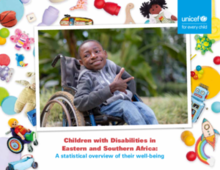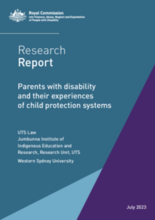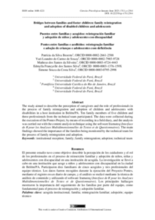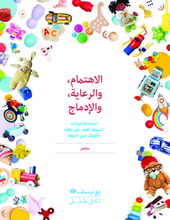Displaying 21 - 30 of 477
This UNICEF report aims to promote the use of data to make children with disabilities in the region more visible, bringing about a fuller understanding of their life experiences. It offers evidence crucial to decision-making to fulfill obligations, both moral and legal, to give every child an equal chance in life.
This research sought to improve understanding of the experiences of parents with disability of Australian child protection systems, paying particular attention to the experiences of First Nations and culturally and linguistically diverse parents with disability.
The Hope for Homes team in Rwanda helps communities become more inclusive for children with disabilities.
DRI asked more than 500 families living in Ukraine what they are now experiencing during the war and what they need. In interviews with DRI staff, parents lay out all the difficult challenges and barriers they face. These interviews provide a blueprint of the change that must occur – by governments, donors, policymakers, caregivers, and communities during the war and recovery process.
This study aimed to describe the perception of caregivers and the role of professionals in the process of family reintegration and adoption of children and adolescents with disabilities in a host institution in Belém/PA, Brazil.
Though research has been conducted on children with disabilities and on children in residential care settings, the intersections of these two topics has yet to be explored in depth. Notably, there is a lack of information surrounding disability measurement within residential care settings, highlighting a gap in the literature. It is estimated that a child with a disability is 17 times more likely to be placed in an institutionalized care setting than a child without a disability, and girls are more likely to be placed in an institution than boys. This report details research conducted in Kenya.
După 60 de ani de activitate în calitate de instituție rezidențială pentru copii cu dizabilități, Școala-Internat Auxiliară Hîncești (SIA Hîncești) din Moldova și-a închis, în cele din urmă, ușile în mai 2022. Închiderea SIA Hîncești și reint
This learning brief shares learning from Kenya around the barriers that contribute to family separation for children with disabilities and how disability networks are working to create a supportive environment for family-based care for these children.
تخل جهود نمضالإعاقة يللأطفال ذو جالإدما دصرعملية تلَّطعتلطالما شاملة. غير أنّ السنوات الأخيرةو ٍةقالتنمية بسبب الافتقار إلى بياناتٍ موثو الأدواتوشهدت جهوداً مُجدَّدة كانت ترمي إلى سدّ الثغرات في البيانات. أدَّت إلى زيادةٍ كبيرة في توافر دقلجمع البيانات تَث ِدحُالجديدة التي است رُوْلبت زّالإعاقة، الأمر الذي عز يجودة البيانات المتعلقة بالأطفال ذوو ج المعرفة.اتنالتحليلات الجديدة وساهم في زيادة إ
Children with disabilities and children on the move represent highly diverse populations living in a broad range of circumstances. But as two of the most marginalized groups of children in the world, there is much they have in common, often-times neglected in data collection, policies and programming. This report examines children’s lives when these two identities intersect.









